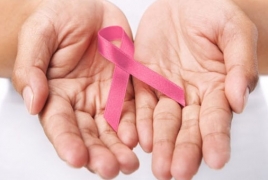T-cell cancer therapy holds promise, longer-term results await July 13, 2017 - 15:22 AMT PanARMENIAN.Net - A novel cell treatment that saved the life of 9-year-old Austin Schuetz was given the green light by U.S. regulatory advisers on Wednesday, July 12 and doctors hope it can save the lives of more children with the most common type of childhood cancer, Reuters reports. An advisory committee to the U.S. Food and Drug Administration voted unanimously to recommend approval of Novartis AG's tisagenlecleucel for treating B-cell acute lymphoblastic leukemia (ALL) in children and young adults who relapsed or failed chemotherapy. The FDA is not required to follow the recommendations of its advisers but typically does so. Austin Schuetz, who lives in Wisconsin, was treated in 2013 with the Novartis therapy as part of a clinical trial after leukemia cells were detected in his brain just two months after a bone marrow transplant from an anonymous donor. "We knew it was risky ... but it was the only option for us," said Kim Schuetz, Austin's mother. She said Austin, then age 6, suffered fever and severe headaches after the engineered T-cells were administered, but today shows no signs of cancer. The new drug class, known as chimeric antigen receptor T-cell or CAR-T, involves a complicated process of extracting immune system T-cells from an individual patient, altering the cell DNA to sharpen their ability to spot and kill cancer cells, and infusing them back into the patient. "The majority of calls we are getting are from patients looking for immunotherapies - particularly CAR-T therapies," said Dr. Gwen Nichols, chief medical officer at the Leukemia and Lymphoma Society. Novartis has lagged some other big drugmakers in the first wave of immunotherapy drugs that are revolutionizing cancer treatment. Companies including Merck & Co Inc (MRK.N) and Bristol-Myers Squibb Co (BMY.N) are logging billions of dollars in annual sales of drugs known as "checkpoint inhibitors" that fight cancer by removing a brake on the body's immune system. "The word is out there that this is different from traditional chemotherapy," Dr. Nichols said. Between 80 percent and 90 percent of children with ALL are cured with intense chemotherapy or bone marrow transplant, but there are few options for remaining patients. "If your child is in that 10 to 20 percent, you are desperate," Dr. Nichols said, while cautioning that it is too early to tell whether CAR-Ts offer lasting remissions for patients. In a clinical trial, 79 percent of patients given the Novartis therapy were alive a year later. Patients with ALL who fail chemotherapy typically have only a 16 percent to 30 percent chance of survival. CAR-Ts can also pose serious risks, including a potentially life-threatening inflammatory condition. If approved by the FDA, CAR-T therapies could cost up to $500,000 and generate billions of dollars for their developers. Authorities said a total of 192 Azerbaijani troops were killed and 511 were wounded during Azerbaijan’s offensive. In 2023, the Azerbaijani government will increase the country’s defense budget by more than 1.1 billion manats ($650 million). The bill, published on Monday, is designed to "eliminate the shortcomings of an unreasonably broad interpretation of the key concept of "compatriot". The earthquake caused a temporary blackout, damaged many buildings and closed a number of rural roads. Partner news |